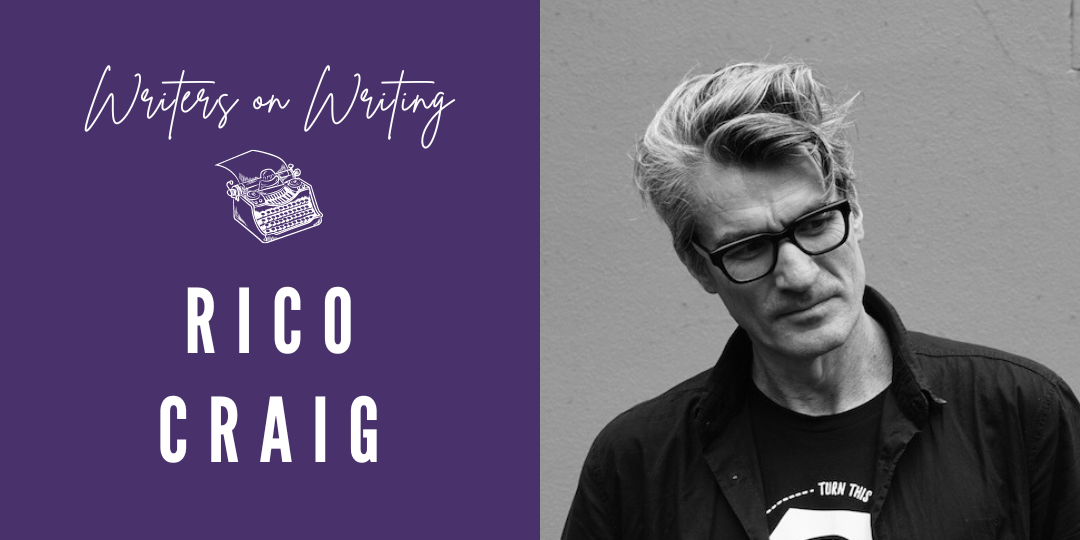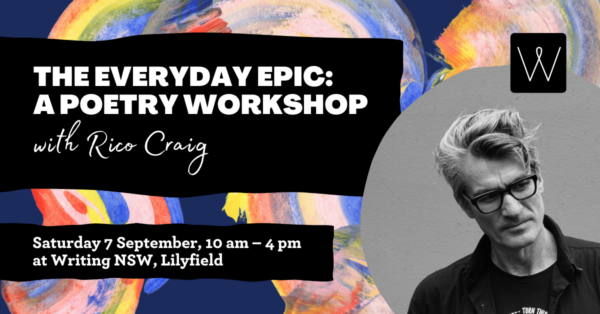
Writers on Writing is our regular conversation with a writer or industry professional about the writing craft, industry insights, and their own practice. This week, we spoke to educator, writer, and award-winning poet Rico Craig about writing from everyday life, ahead of The Everyday Epic: A Poetry Workshop
How do you sift through the mundane of the everyday to find the beauty worth putting on the page?
Sifting is such an interesting word, I believe that it’s possible to train your brain to do a kind of sifting that is actually combining. Sifting is often about allowing yourself to notice, hoarding what you notice, be it images, mundane observations or ideas, and then waiting for our imperfect minds to mix them up into something new. It’s important to understand that this hoarding of ideas is itself an acknowledgement that there is often something beautiful or compelling or slightly magical even in what appears to be mundane. We all walk around with a stock of day to day stuff floating around in our head, each of us has our own particular stock of thoughts, experiences and observations; what is up there in our head can only be ours. Revisiting that stock, allowing things to fall into unusual relationships with each other is where the first flickerings of originality come from. There’s a lot of work to do after the first idea, but that spark in the mundane is often where a piece of writing begins.
It’s also important to actually get something down on the page, writing consistently gives you the chance to churn through some of the material from daily life. You have to place yourself in the position where an idea can become a piece of writing, even a draft. That’s the first step. Write something everyday, your brain seeks out the interesting, and writing consistently gives the different parts of your life, perceptions, etc., a chance to connect, combine and become something new.
What’s your understanding of the ‘epic’ poem and how can it be reappropriated in new forms?
The ‘epic’ of this workshop is less focused on a traditional conception of the epic and more intent on writing about the everyday with an epic appreciation and intent. It will ask participants to consider the way daily life is itself epic and filled with wonder and drama. I won’t be asking participants to rewrite the the old epics, though I do love some of those reimagined epics, and I have to admit we’ll be using Anne Carson’s Red in this workshop, which I think is a wonderful example of how the epic can be reimagined.
We’re living in an age of attention deficiency; do you think we should we lean into the beauty of brevity or pull back against the tide and let our lines be lengthy?
I love a long line. I love the way they bring thoughts and images together in unusual combination. I think it relates in a way to the idea of appreciating the everyday. Expansive lines and the play of ideas and language in longer lines asks us to be aware of the complexity in the everyday, but at the same time it allows us to drift. I think the question about brevity is often a question about form more than individual lines. It’s fascinating to me how in the last ten to fifteen years there’s been a real revitalisation of forms like the sonnet – a short compact form that seems well suited to the pace of the modern world. The sonnet allows you to create a glimpse into an idea, to make something that’s a little like an idea portrait, but at the same time allows you to create longer more sustained pieces, like the crown of sonnets, made up of a number of sonnets. So the interplay between the desire for brevity and longer forms has always been something poets have been able to play with. I guess my answer in terms of the line and form, is that poetry is infinitely flexible, it gives us so many ways to reach out to the reader. Sometimes snippets, fragments, short lines and short forms work incredibly well, but I’m also very interested in how these shorter forms or even fragments have the potential to invite the reader into a longer body of work. The reader has the choice to enter or search further.
In my recent collection Nekhau, I weave lines from the title poem through the collection, so the reader encounters these snippets as they read through the book. They’re just brief breaks between the other poems, but hopefully they build up across the collection so that when the reader reaches the poem itself there are elements that have become familiar and recognisable. So the familiarity built up in the short sections of poem helps to sustain the reader through the complete poem. And, hopefully, helps to allow certain lines in the poem to have increased resonance for the reader, I’m hoping the repeated lines and images flash in the reader’s mind like memories!
Myth retellings have been popular across all forms of media for decades. What advantage do you think poetry holds in exploring ideas of myth in unique ways?
I think there are two interesting ways to dig into this, the first is using the myth as a receptacle into which poets decant their experience of the modern world; and a second way in which elements of myth are woven into a poem or collection in a way that is a little less overt. In my collection Nekhau, I weave the myth of the nekhau – a tiny, fish-shaped amulet tied into the hair of loved ones to protect them from drowning – through the collection, using it as a way to explore the connections between love, fear and loss.
Both ways of retelling myths are trying to underline certain aspects of the modern psyche and experience, to help us see the strange continuities of experience. Most of the time I’m uncertain if I think it’s utterly amazing or entirely predictable that there are core emotions and experiences that continue to be repeated in writing of all types. Myths, the borrowing of epic elements, enable us to trace the continuities of human experience. It’s sustaining to write into these histories. And, yes I do think that poetry is able to explore and represent these myths in a way that combines brevity with an emotional resonance, and most importantly in a way that stays relevant to the way we live in this world.
Who are some epic poets you’ve read recently and enjoyed?
I’ve been in the UK recently, including visiting the River Dart, so I’ve been thinking a lot about the work of Alice Oswald and how she investigates the mythologies of place in an incredibly profound way. And…continuing for a moment in the UK vein, obviously the work of Max Porter in recent years, the way his mythologies manage to permeate the modern world and capture the joys and anxieties we live through, has been a bit of a revelation.
During the workshop we’ll be looking at work from poets like Kayo Chingonyi, Kiki Petrosino, Natalie Harkin, Aracelis Girmay, Ross Gay and Dan Hogan. All who have their own special ways of discovering the epic in the everyday.
Rico Craig is an educator, writer, and award-winning poet whose work melds the narrative, lyrical and cinematic. Craig’s poetry has been awarded prizes or shortlisted for the Montreal Poetry Prize, Val Vallis Prize, Newcastle Poetry Prize, Dorothy Porter Poetry Prize and University of Canberra Poetry Prize. His poetry collection Bone Ink (University of Western Australia Publishing) was winner of the 2017 Anne Elder Award and shortlisted for the Kenneth Slessor Poetry Prize 2018; Our Tongues Are Songs, his second collection of poetry, was published in 2021.
Between 2012 and 2024 he worked as Storyteller-in-Chief at the Story Factory, designing and facilitating creative writing programs for young people, and teacher development programs for adults. He now works as a writing and creativity consultant, assisting public institutions and private organisations to improve storytelling capacity, formulate education policy and develop internal training. His latest collection, Nekhau, was released in 2022 by Recent Work Press.
Enrol in The Everyday Epic: A Poetry Workshop with Rico Craig at Writing NSW on Saturday 7 September 2024, 10 am – 4 pm
If you want to be the first to read great advice, prompts and inspiration from our incredible tutors, subscribe to our weekly e-newsletter Newsbite.
More from Writing NSW
Check out our full range of writing courses in Sydney, our online writing courses and our feedback programs to see how we can help you on your creative writing journey. Find out about our competitions and opportunities, as well as writing groups across NSW, and sign up to our weekly newsletter for writing events, opportunities and giveaways.

